

Visiting the Library
- Location & Parking
- Main Library Contacts
- Staff Directory
Career Opportunities
- Law Librarianship Education
- Current Openings
Access Materials
- Interlibrary Loan & Document Delivery
- Course Reserves
- Search the Catalog
- Legal Databases
- All Databases
- Bloomberg Law
Library Resources
- Conference Rooms
- Technology Help
- Research Guides
- New Acquisitions
- Stack & Call Number Guide
- Ask a Librarian
- Reference Desk Hours
- Services to the Public
Collections
- Archives & Special Collections
- Digital Collections
- Federal Documents
- Law in Popular Culture
Liaison Services
- Find Your Liaison
- Current Awareness
- Scholarship Support
- Research Instruction
Collection Services
- Borrowing Materials
- Faculty Document Delivery Requests
- Submit a Course Reserve
- Submit a Past Exam
- Access NYT & WSJ
Course Support
- Past Exams Database
- Study Aid Guide
Student Guides
- 1L Calendar
- 1L Tarlton Calendar
- Faculty Research Assistants
- Law Review Students
- Graduating Students
Legal Research
- Bloomberg, Lexis, & Westlaw
- Seminar Papers & Law Review Notes
- Research Refresher
- Course Offerings
Student Services
- How to Print, Copy, and Scan
Find books, ebooks, and more (Koha)

QUICK LINKS
Databases My Library Account Library Contacts Library Hours Submit a Suggestion
CONTACT INFORMATION
Ask a Librarian (Reference Desk) ( Email , Chat , or call 512-471-6220)
Circulation Desk ( [email protected] or call 512-471-7726)
Tech Desk (UT Law Student support) ( [email protected] , Chat or call 512-232-1567)
SPOTLIGHT & NEWS
Studying at Tarlton
Tarlton's Past Exam Database is available for Texas Law students as they start to prepare for spring semester exams. Conference Rooms are also available for student use at the library. Room can be reserved using Tarlton's online form . Study aids can be found in Tarlton's Hyder Popular Reading Room on the main floor of the library. Study aids are also available through the library's subscription to the West Academic Study Aid Collection . Best wishes as you finish the semester!
Visit Campus
Envision yourself at UT Austin by visiting our campus! We have a variety of options to help you explore the Forty Acres on your terms. In-person campus tours and info sessions are available. For those needing online options, check out our online tour or book an online info session.
In-person Campus Tours
The best experience is taking a campus walking tour. Register today!
In-person Info Sessions
Want to explore more while you're visiting campus? Join us for one of our upcoming in-person sessions.
Online Info Sessions
Want to learn about a particular college, school or academic program? Join us online for one of our upcoming info sessions.
Want to take an online tour? We’ve got you covered. Explore the Forty Acres wherever you are.

Watch the College Tour!
Amazon’s College Tour series introduces students to universities around the nation. In the UT Austin episode, students share their experiences as Longhorns and what life is like in Austin.
The College Tour
Admissions Centers
Our admissions centers are a great place to meet counselors and start your UT admissions journey. You can visit our location on campus as well as our regional centers around Texas.
Abbott's condemnation of UT protesters contrasts with his 2019 stance on campus free speech
Gov. greg abbott and others see antisemitism at the root of the ut protests. but is that an inaccurate oversimplification.

In a 2019 post on social media, Gov. Greg Abbott made a show of signing into law a measure that he said would protect the freedom of speech at institutions of higher learning across Texas, which the Republican warned was then under attack.
"Some colleges are banning free speech on college campuses," Abbott said in a 29-second video post on the platform then called Twitter. "Well, no more, because I'm about to sign a law that protects free speech on college campuses in Texas."
That tweet was resurrected Wednesday after Texas Department of Public Safety troopers, acting on Abbott's orders, aggressively arrested dozens of demonstrators at the University of Texas during a peaceful protest in support of Palestinian rights and against the Israeli military's bombardment of Gaza in reprisal for the Oct. 7 attacks on the Jewish state by Hamas, a Palestinian militant organization.
Even as posts such as "Free speech for me but not for thee" by U.S. Rep. Greg Casar, D-Austin, spread virally across the platform now called X that deplored the DPS show of force, a defiant Abbott signaled his support for putting an end to the demonstration, which organizers described as having a "peaceful" intent though it was carried out despite UT, a state supported institution, saying the protest was against its rules.
"Arrests being made right now & will continue until the crowd disperses," Abbott said on X about three hours into the mass demonstration at one of the state's flagship universities. "These protesters belong in jail."
The governor's forceful words were hailed by national figures in his party, who contrasted them with Abbott's Democratic counterparts in other states who have taken a less aggressive stance with the recent wave of pro-Palestinian demonstrations at universities nationwide.
"This is what leadership looks like," posted U.S. Rep. Elise Stefanik, R-New York, who chairs the U.S. House Republican Conference. "Instead of letting the antisemitic pro-Hamas mob take over, (Abbott) is taking action and sending a clear message."
Abbott, too, sought to link the demonstrations, which included several Jewish students among its supporters, as antisemitic. But many demonstrators and their supporters said Abbott and others are falsely conflating the desire for a Palestinian homeland and the protests against the policies of Israeli leaders and its military forces with being hostile to the Jewish people.
Austin resident Bassel Tizani, whose son was among those arrested at the protest, said the demonstrators were not motivated by prejudice.
"Freedom of speech, human rights, that’s what we stand for," he told the American-Statesman. "My kids asked me yesterday, they wanted to participate. I fully supported them because they're just expressing their opinions peacefully and just want to say there is an oppressed people and we want to stand with them. "We don’t have anything against Jews. We have problems with occupying land. We have problems with people stealing people’s land."
The irony of Abbott's 2019 tweet was not lost on Jawab Rasul, imam of the Islamic Center of Brushy Creek in Cedar Park.
"And now (Abbott's) the one who's calling these people criminals and saying that they belong in jails and they should be expelled," Rasul told the Statesman. "What's even sadder is that these people are being arrested and demonized, being called names, while they are calling for an end to genocide, while the people who are actually committing the genocide are receiving our money and our taxpayer dollars and 30,000-plus people have been killed."
Cal Jillson, a political science professor at Southern Methodist University in Dallas, said the response by Abbott and the DPS troopers at UT dovetails with the governor's hawkish approach to border security, which has made the Texan a national political force. And it plays into what Republicans hope will be a defining thread in the 2024 election cycle as it swings into high gear ahead of this summer's national conventions, Jillson said.
"It's part of a broader pattern across the country on the Republican side from Trump on down, the belief that law and order will be one of the themes that will help them in the coming elections," Jillson said. "That standing for law and order with scruffy students on the other side of the barricade is good for your electoral prospects."
But Jillson, who was a college freshman in 1968 during campus unrest rooted in the opposition to the Vietnam War, said the pro-Palestinian demonstrations have not yet risen to the level of a national crisis.
"I think there is always a danger of overplaying your hand," Jillson said. "Whether it's at the border or ... claiming that UT is spiraling out of control. If people are watching, they know that those are overstatements."
Jeremi Suri, a UT professor of public affairs and history, said Abbott and others are overplaying their hand when it comes to branding the campus protest as being rooted in antisemitism. In the second half of the governor's quote about sending protesters to jail, Abbott said: "Antisemitism will not be tolerated in Texas. Period. Students joining in hate-filled, antisemitic protests at any public college or university in Texas should be expelled."
Suri said he observed Wednesday's demonstration at UT for about an hour. He described himself as "a proud Jew" and avowed opponent of antisemitism. He said the governor's comment and others like them do little to advance what should be a serious conversation about prejudice and bigotry.
"I did not hear a single antisemitic statement (during) the whole time," Suri said. "And I'm Jewish; I'm sensitive to antisemitic comments. I'm against antisemitism. There was no antisemitism among that group of students — nothing being expressed at that moment."
"It does a real disservice to Jews like me," he added, "because we have to be concerned about real antisemitism. And if we're crying wolf and we're saying there's antisemitism, and he's in places where it's not, then we're not paying attention to where it is."
Suri said contrary to Abbott's statements, the demonstrators' criticism of Israel's tactics is not necessarily a condemnation of the longtime U.S. ally and an attack on American Jews.
"I'll tell you where I stand," he said. "I believe Israel has the right to defend itself, but I believe Israel has gone way beyond the legitimate use of force, and I believe Israel has committed war crimes in Gaza. But I'm a proud believer in a Jewish homeland. But I'm very critical of Israel because I think what Israel has done is wrong and also ineffective. That's not antisemitism at all."
Suri also noted that the cries of antisemitism used to describe the campus demonstrators contrast with the somewhat muted response to reports of influential Texas Republicans meeting with self-avowed Nazi sympathizer and antisemite Nick Fuentes in Fort Worth last year.
"We're attacking the wrong people for political reasons," Suri said. "And we're letting the real antisemites continue to do their work."
Statesman staff writer Bayliss Wagner contributed to this report.
- International
April 24, 2024 - US university protests
By Adrienne Vogt, Christina Zdanowicz, Elise Hammond, Samantha Delouya, Chandelis Duster, Tori B. Powell, Emma Tucker, Elizabeth Wolfe and Kathleen Magramo, CNN
"Tense interactions" and "physical struggles" erupt at UT-Austin campus amid pro-Palestinian protest
From Ashley Killough in Dallas
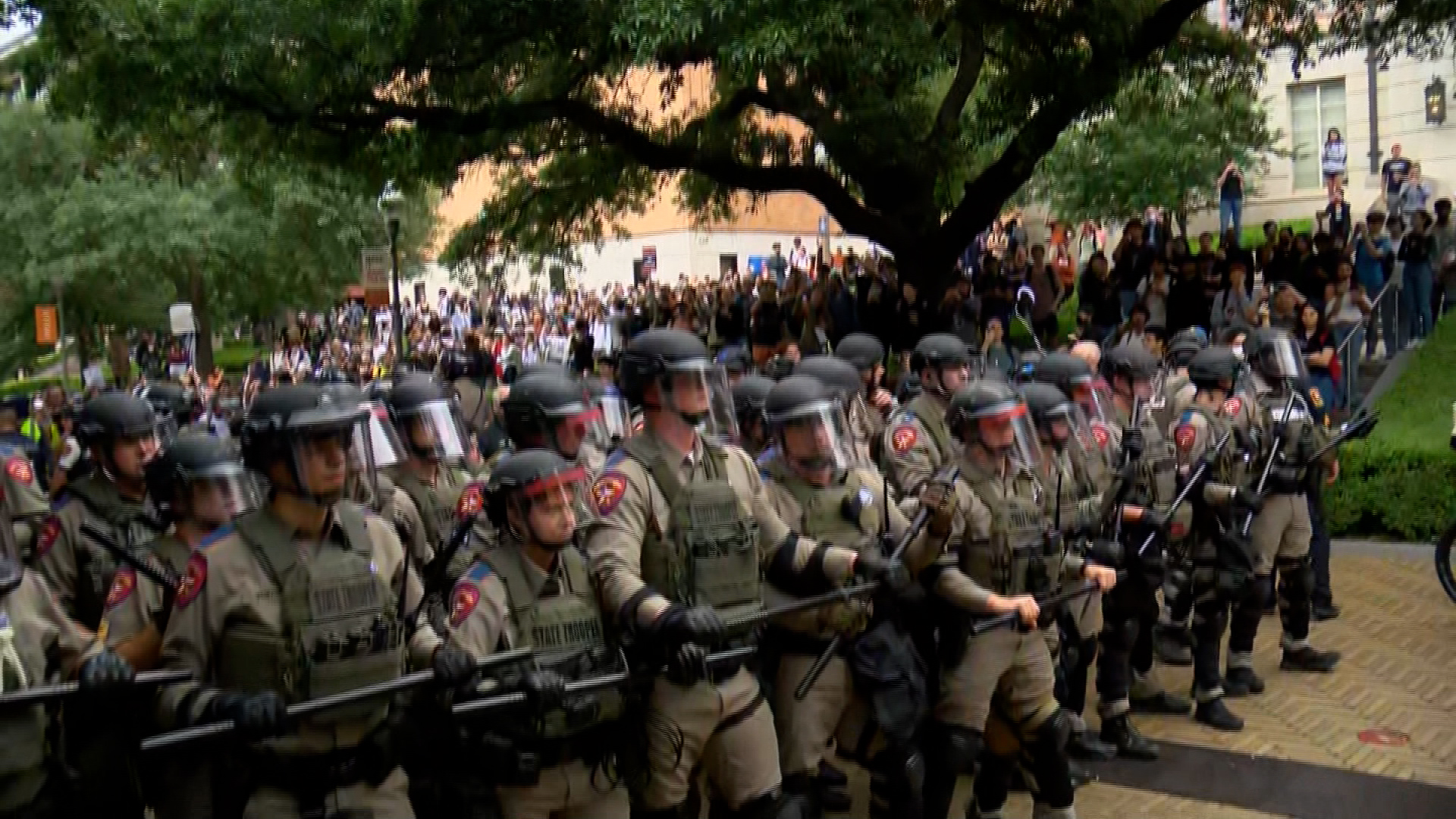
Texas State troopers in riot gear, including some on horseback, began breaking up a group of pro-Palestinian protesters at the University of Texas at Austin shortly after a demonstration began Wednesday.
The Palestine Solidarity Committee in Austin organized the walkout and occupation on the school's South Lawn. According to an Instagram post announcing the event, students were encouraged to bring "blankets, food and water, face masks, and lots of energy."
Amelia Kimball, associate managing editor at The Daily Texan, told CNN there were no plans for an encampment like on other university campuses across the country.
Kimball said students gathered in a central area of campus and within minutes were ordered to disperse. Kimball said she's seen law enforcement form multiple blockades in the area to keep the crowd dispersed.
She also described "tense interactions" and "physical struggles between police and students." Some of those scenes, including an arrest, were captured by CNN affiliate KEYE.
"I don't think students were expecting this kind of a response," she said on CNN, saying some students have spread out while others remain in the crowd.
Kimball said she started noticing a large law enforcement presence earlier in the day before the protest began.
CNN has reached out to the Texas Department of Public Safety, the University of Texas and Austin Police.
USC says there is "significant activity" on campus amid protest
From CNN's Chandelis Duster
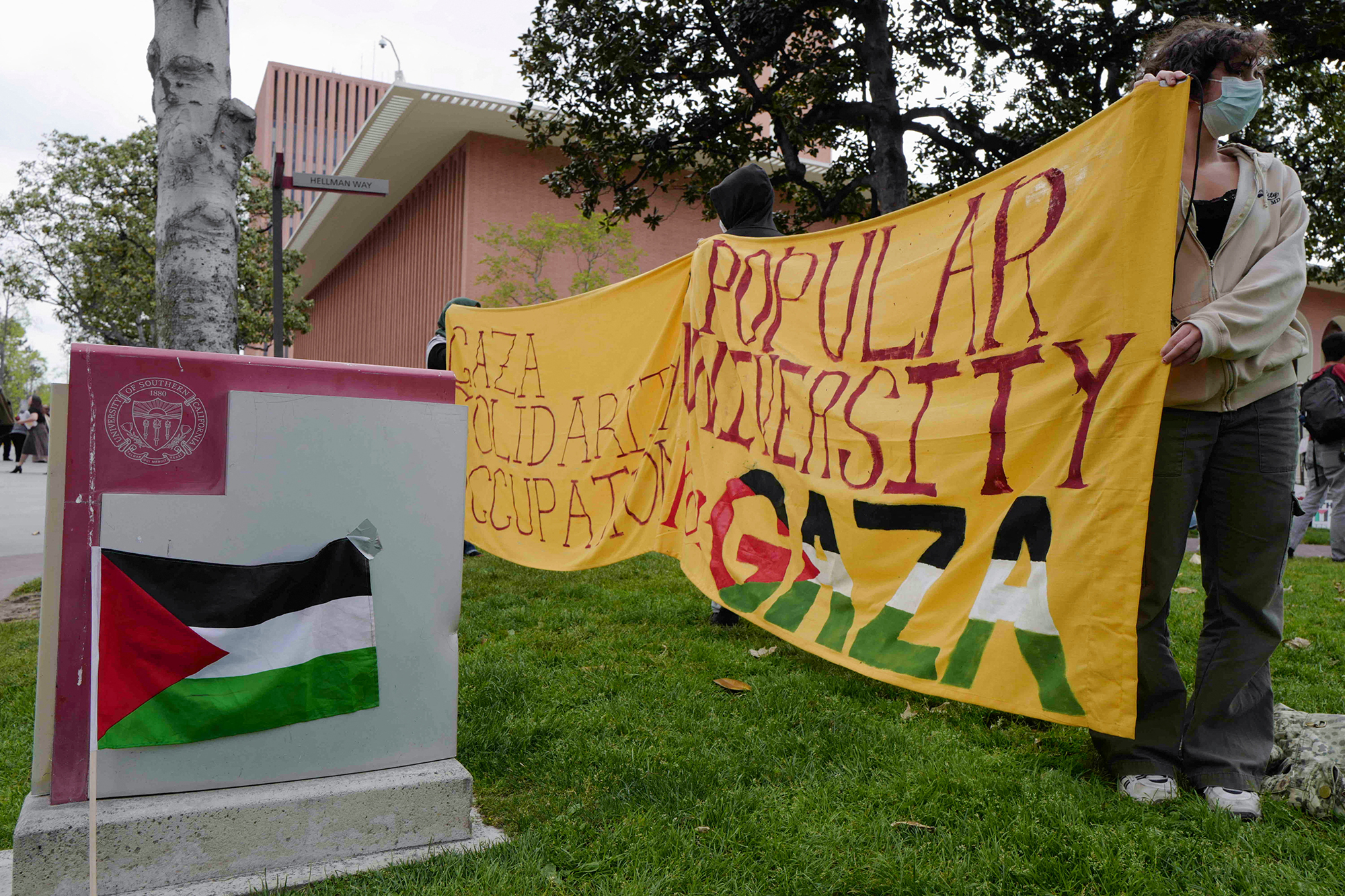
There is "significant activity" at the University of Southern California's University Park Campus due to a demonstration, according to an alert sent by the school on Wednesday.
"There may be difficulty accessing that area," according to the school.
Tuesday's protest on campus was peaceful this morning and protesters had set up tents, according to CNN's Nick Watt, who is on the scene.
Police seen pushing back protesters at University of Texas at Austin
From CNN's Christina Zdanowicz
Texas State Police were seen pushing back pro-Palestinian protesters on the University of Texas at Austin campus Wednesday afternoon, as witnessed by CNN affiliate KEYE.
Footage aired on CNN showed a chaotic scene, with what appeared to be shouts of “disperse” from law enforcement officers and a large crowd of student protesters shouting back.
“There does seem to be some escalating levels of distress, and protesters are continuing to chant, and the police are forming multiple blockades to keep protesters from moving,” Amelia Kimball, associate managing editor at The Daily Texan, said on air with CNN.

Secretary Buttigieg urges campus protesters to demonstrate "safely"
From CNN's Sam Fossum
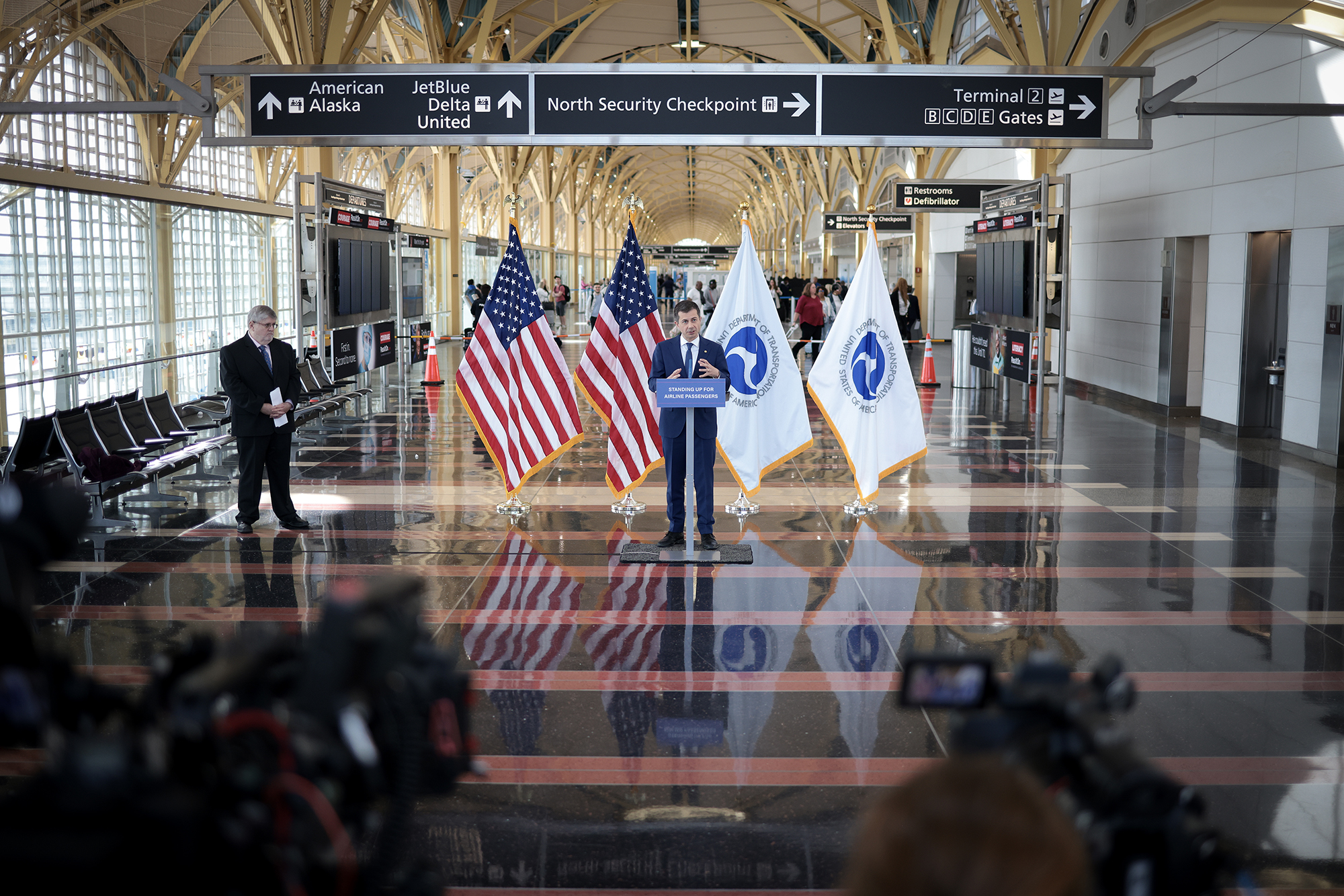
Transportation Secretary Pete Buttigieg reacted Wednesday to the ongoing pro-Palestinian protests that are taking place on university campuses across the country, calling for protesters to “safely” make their voices heard.
He also highlighted the importance of distinguishing between peaceful protests and harassment.
“It is important when people are exercising those rights to free speech, to protest, to assembly, that they do so safely,” Buttigieg said on Fox News Wednesday afternoon, adding later: “We have to make a distinction between what is legitimate free speech, inquiry, protest, debate, ferociously contested ideas. That’s one thing. And of course, also a recognition of the pain that is driving so much of the passion around the issues in the Middle East.”
Buttigieg also condemned any expressions of antisemitism or threats of physical violence or harm against Jewish students.
“Any expression of antisemitism or hatred is unconscionable, it must be called out, it must be confronted. And that’s certainly what President Biden has done in unambiguous terms,” Buttigieg said, continuing: “Especially disturbing [is] the idea that a student would be targeted and harassed simply because they are Jewish, or simply because they look Jewish.”
Columbia student protesters say administrators made written commitment to not call in NYPD or National Guard
From John Towfighi and CNN's Matt Egan
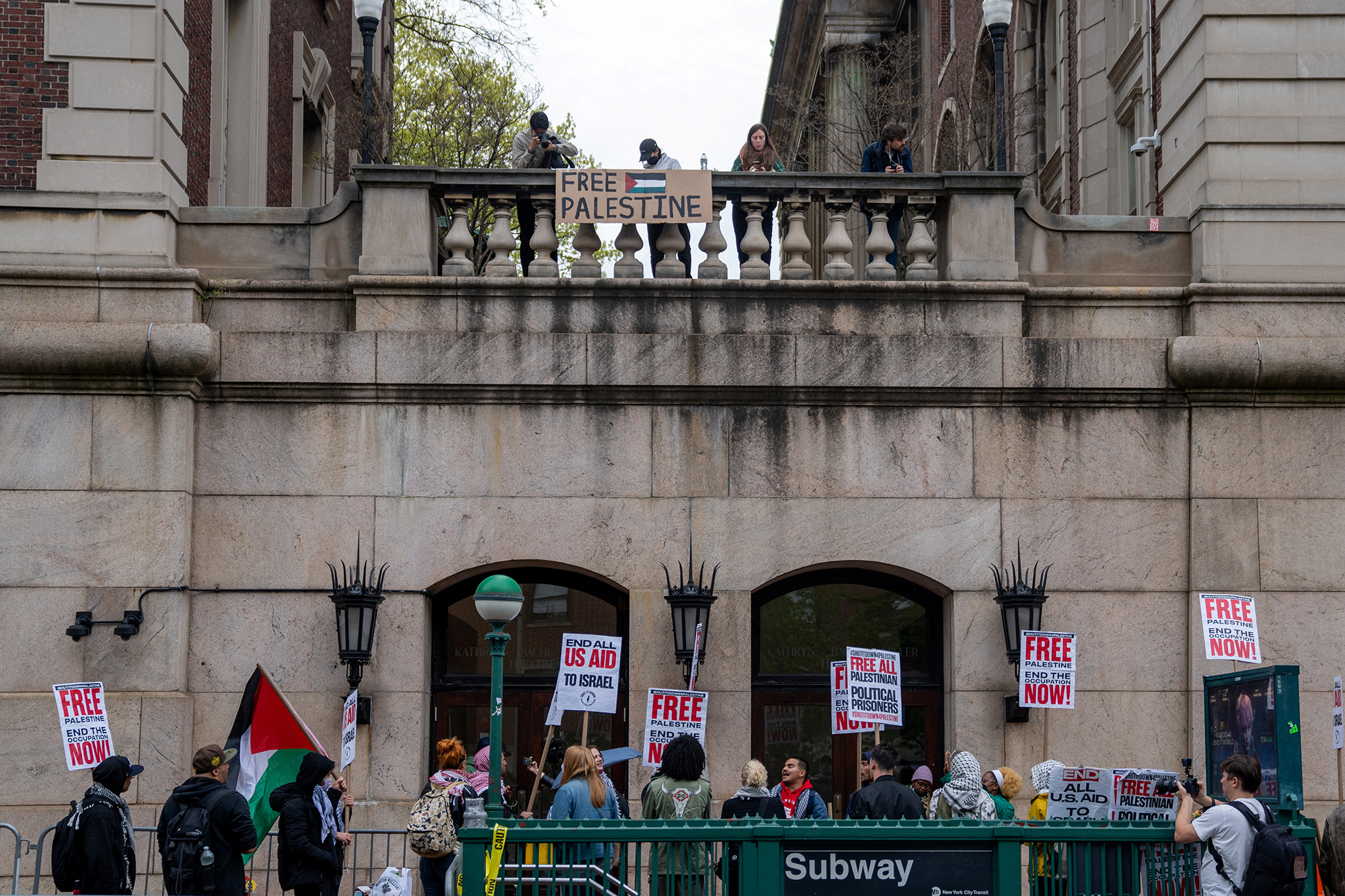
Columbia University student protesters issued a statement on X Wednesday afternoon claiming that university administration provided a written commitment Tuesday night to not call in the New York Police Department or the National Guard to break up the encampments after students refused to stay at the negotiating table.
"The University's previous threats of an imminent sweep by the NYPD or the National Guard had severed negotiations. The administration's threats backfired when student negotiators refused to stay at the table," according to the statement.
Susan Ellingwood, assistant vice president of public affairs at Columbia, told CNN earlier Wednesday that “deploying the National Guard was never on the table.”
The students' statement was posted on behalf of Columbia University Apartheid Divest, the student group responsible for organizing the original encampment on the East Lawn. It has also been involved in organizing the West Lawn encampment and negotiating with Columbia's administration.
"Columbia's reliance on the threat of state violence against peaceful protestors has created an unstable ground for the negotiations process which will continue over the next 48 hours. However, Columbia's written commitment and concession not to call the NYPD or the National Guard signifies an important victory for students," the statement continued.
Student protesters said they plan to hold a news briefing at 2:30 pm ET outside the university's Butler Library.
2 arrested during protest at Ohio State University on Tuesday
From CNN's Nicquel Ellis and Rebekah Riess
Two arrests were made during a pro-Palestinian protest on Ohio State University’s campus on Tuesday, according to a university spokesperson.
“When yesterday’s demonstration became disruptive to the students, faculty and staff in Meiling Hall, the university issued multiple warnings. When the disruptive activity continued, two individuals were arrested,” OSU spokesperson Benjamin Johnson said. “Ohio State has an unwavering commitment to freedom of speech and took this action in alignment with our space use rules to provide for the orderly conduct of university business.”
In a message to faculty and students on Monday, Ohio State University President Walter “Ted” Carter Jr. said the university would “consistently enforce” its space rules, “which do not allow for intentional disruptions of university events, classes, exams or programming, including commencement.”
“When protected speech becomes incitement or threats of violence, Ohio State has and will always move quickly to enforce the law and university policy. I will not compromise on this,” the president wrote, noting that OSU would continue to have university police on site for student demonstrations.
Any violation of university policy will get a warning, but may be “cited, referred to Student Conduct and/or arrested” should they continue, Johnson told CNN.
When asked if OSU would consider the students’ demands for divestment from Israel, Johnson said state law “prohibits the university from divesting any interests in Israel and prohibits adopting or adhering to a policy that requires divestment from Israel or with persons or entities associated with it.”
President Biden not planning to visit Columbia protests
From CNN's MJ Lee
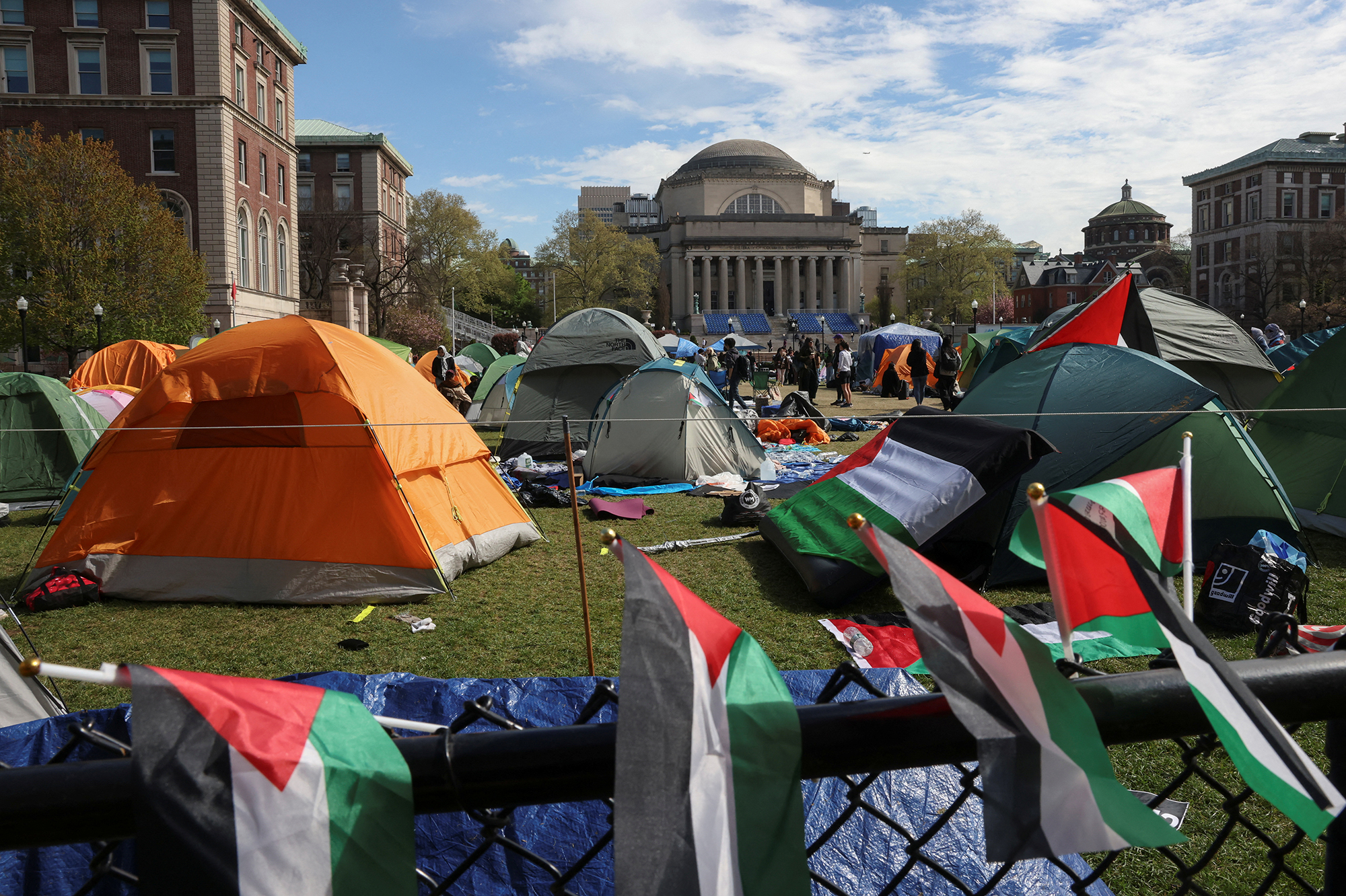
President Joe Biden will be in New York City Friday, but White House and campaign officials told CNN Wednesday there have been no internal discussions about him visiting Columbia University.
Some demonstrators say the Biden administration is complicit in the deaths of the many thousands of civilians in Gaza.
Groups of senior White House officials have traveled to cities with large Muslim and Arab populations in recent weeks to meet with local community leaders and hear their concerns – gatherings that have at times prompted calls for boycotts.
White House spokesman Andrew Bates said Tuesday that the White House was monitoring “closely” the protests on college campuses and that he takes seriously the conversations he has had with community leaders about the current “painful moment.”
Speaker Johnson says he will call on Columbia president to resign
From CNN's Haley Talbot
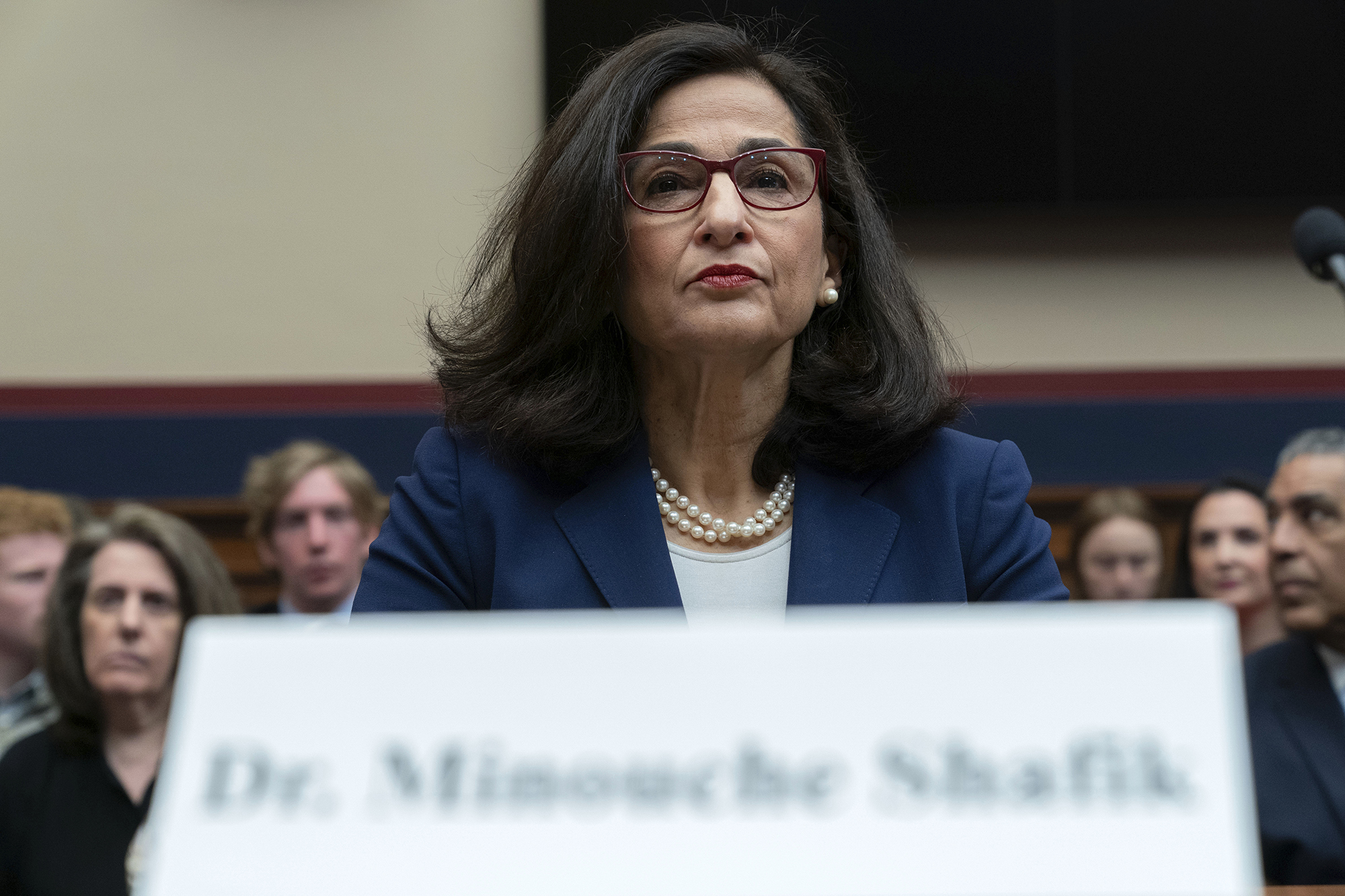
House Speaker Mike Johnson says he will call on Columbia University President Nemat "Minouche" Shafik to resign when he joins Jewish students on campus Wednesday.
“We'll be hosting a press conference there with some of my colleagues from the House Republicans from New York to call on the president of the university to resign. It's unconscionable. This President Shafik has shown to be a very weak leader. They cannot even guarantee the safety of Jewish students. They're expected to run for their lives and stay home from class,” he said on Hugh Hewitt’s radio show Wednesday morning.
Johnson added that “what we're seeing on these college campuses across the country is disgusting and unacceptable.”
While at the university this afternoon, Johnson will have a meal with Jewish students before the event. He will be joined by New York Reps. Mike Lawler, Nicole Malliotakis and others in the New York Republican delegation.
“We're relying on and calling upon and demanding these university officials to control of the situation, which is just completely out of control right now,” Johnson said.
Johnson also proposed revoking federal funding and "student visas for these violent protests" in the wake of the unrest.
Columbia University says final exams must include a remote option
From CNN's John Towfighi
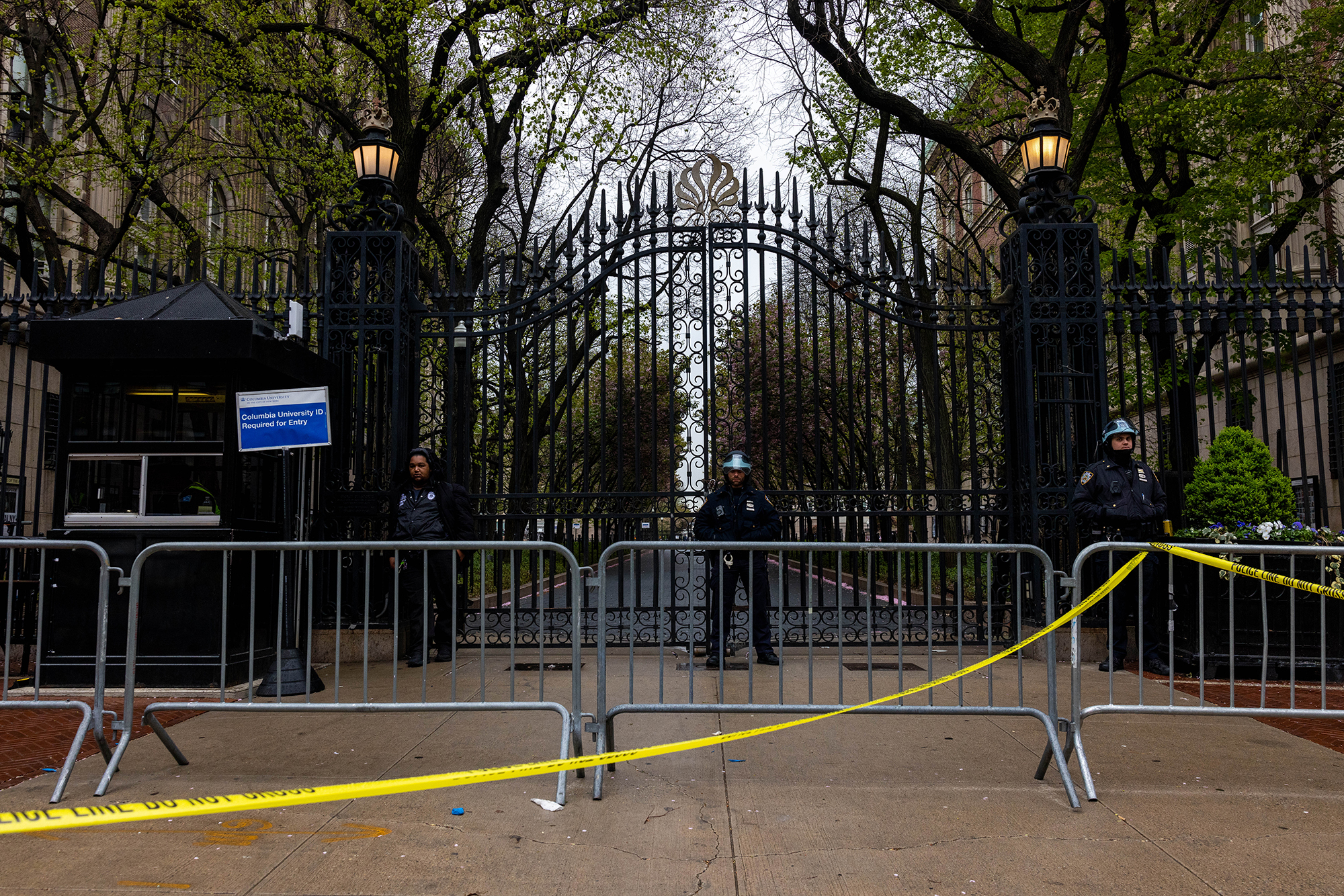
Columbia University notified students and faculty Wednesday morning that the hybrid model for classes will extend to final exams.
Provost Angela Olinto said in an email that all final course assessments, including exams, presentations and projects, "must include a remote option for students who have requested support for virtual assessment."
The move was made "in order to address the concerns of our members in an evolving campus environment" on the main Morningside Heights campus, Olinto said.
The university announced classes, which end Monday, would be hybrid for the remainder of the academic year. Final exams take place from May 3 to May 10.
Olinto said that final assessments at Columbia's Medical Center and Manhattanville campus will continue as scheduled.
Please enable JavaScript for a better experience.
The University of Chicago The Law School
Law school federalist society wins 2024 chapter of the year award.
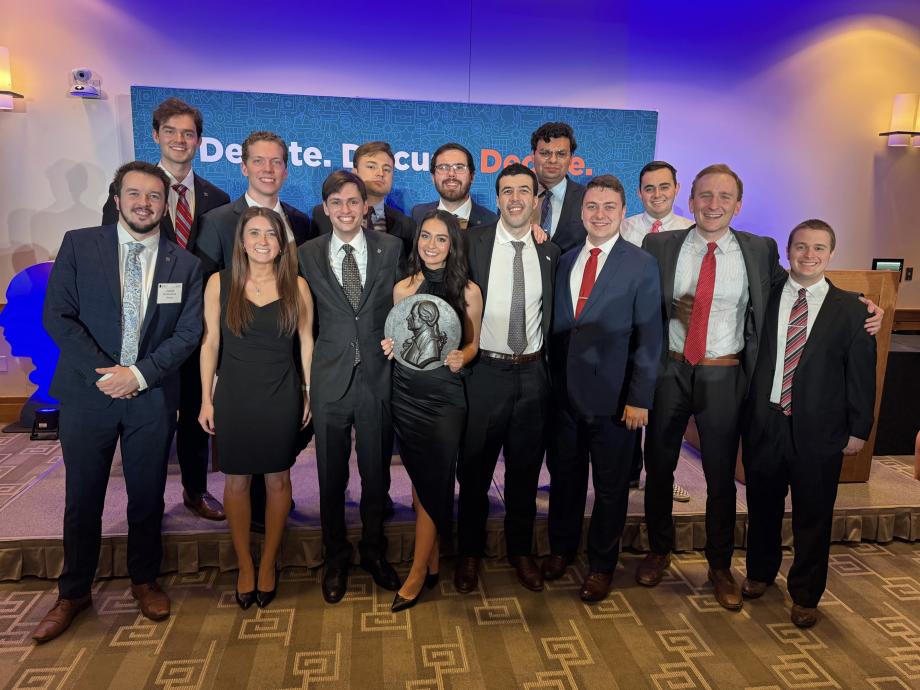
The University of Chicago Law School Federalist Society received the James Madison Chapter of the Year Award at the national organization’s annual student symposium that was hosted at Harvard Law School this spring. The last time the Chicago chapter won the award was in 2019.
The victory capped a very productive year for the Law School Federalist Society, characterized by robust efforts to enhance alumni engagement. The chapter launched several new initiatives, including an alumni mentorship program pairing members with alumni across the country, an alumni newsletter, and a student-focused professional development newsletter.
This year, the chapter also visited the Supreme Court of the United States. Thirty-four chapter members traveled to D.C. to meet with Justice Brett Kavanaugh, a visit facilitated by a Law School alum who had clerked with the Justice.
“Our chapter was honored to meet Justice Kavanaugh,” remarked Chicago Chapter President Tiffany Pages-Sanchez. “We were excited to participate in a quick meet-and-greet, but Justice Kavanaugh spent over an hour answering all our questions. Every student in attendance had the chance to ask him a question. It was an incredible experience. Our chapter is grateful for Justice Kavanaugh’s generosity.”
The Law School Federalist Society Chapter hosted nearly 50 lunch talks and welcomed 23 federal judges to campus over the last year. And as part of its efforts to foster debate and collaboration across the Law School, the chapter teamed up with seven other student organizations, including the American Constitution Society, the Texas Law Society, and the St. Thomas More Society, to host almost 15 co-sponsored events.
“UChicago is a special place,” said Pages-Sanchez. “We’re proud to belong to a law school where students and faculty are keen to engage with and debate the ideologically diverse speakers we host at our events. We’re also grateful for our alumni’s willingness to remain involved in our chapter; their strong engagement helped make this year a great success, especially as we launched the new mentorship program. We are particularly grateful for the continued involvement of Professor Todd Henderson, ’98; Adam Mortara, ’01; Solicitor General Eric Wessan,’19; Sarah Welch, ’19; Matt Pociask, ’20; and Sam Ellis, ’23.”
Todd Henderson, the Michael J. Marks Professor of Law and the chapter’s faculty director, expressed immense pride in the chapter's accomplishments. “The culture of our chapter is one of a passion for ideas, professionalism, flawless execution, and a deep commitment to the values of the Society. The student leaders are prodigious and exemplary.”
Henderson went on to quip, “I’m surprised they don’t win every year—I guess they need to spread it around.”
Advertisement
Supported by
Columbia’s University Senate Calls for an Investigation Into the Administration
The senators voted for a resolution that accused the administration of breaching the due-process rights of students and professors.
- Share full article

By Stephanie Saul and Anna Betts
Columbia University’s senate voted on Friday to approve a resolution that called for an investigation into the school’s leadership, accusing the administration of violating established protocols, undermining academic freedom, jeopardizing free inquiry and breaching the due process rights of both students and professors.
The university’s president, Nemat Shafik, has been under attack for her decision last week to summon the New York Police Department to campus, resulting in the arrest of more than 100 student protesters, and for her earlier congressional testimony, in which professors accused her of capitulating to the demands of congressional Republicans over free speech and the disciplining of students and professors.
The resolution, adopted by a vote of 62-14, with three abstentions, fell short of a proposal earlier in the week to censure Dr. Shafik, which many senators worried could be perceived as yielding to Republican lawmakers who had called for her resignation over her handling of antisemitism claims.
The senate resolution was based partly on a damaging report by the senate executive committee, which accused Dr. Shafik’s administration of engaging in “many actions and decisions that have harmed” the institution — including the hiring of an “aggressive” private investigation firm.
The report, which was discussed in Friday’s meeting, said that investigators harassed students and used “intrusive investigation methods,” which included “investigators’ attempt to enter student rooms and dormitories without students’ consent.”
Investigators, the report said, demanded “to see students’ phones and text messages with threats of suspension for noncompliance.”
The report found that, “Overall, the fundamental lack of good-faith engagement with all campus constituencies and groups has exacerbated the situation and has served to divide our community.”
The resolution also calls for establishing a senate task force to investigate university decision-making.
In a statement following the senate vote, a spokesman for the university said the administration and the senate “share the same goal of restoring calm to campus so everyone can pursue their educational activities. We are committed to an ongoing dialogue and appreciate the Senate’s constructive engagement in finding a pathway forward.”
The resolution may have little practical impact. The senate, made up of faculty, students and administrators, is not empowered to remove the president. But some senators expressed concern during the two-hour meeting that the resolution could further erode Dr. Shafik’s relationship with the Columbia community, heightening the crisis facing the campus.
The chaos engulfing the university over the war between Israel and Hamas, and the administration’s handling of an encampment of student protesters on campus, have led to calls for Dr. Shafik’s resignation from disparate groups, including congressional Republicans and pro-Palestinian demonstrators.
During the meeting on Friday, Nachum Sicherman, a professor of economics, urged senators to take outside interference into account and to vote against the proposal.
“We are in a serious crisis, and I don’t see how weakening a president who is under attack from both the right and left is going to help resolve the crisis,” he said.
During the debate, which was at times heated, some senators raised questions about whether the body should have specifically addressed claims of antisemitism on campus.
Carol Garber, a professor of behavioral sciences, said she feared that the senate resolution “has ignored the impact of the hostile and aggressive language and actions toward Israeli and Jewish students, faculty and staff on this campus.”
The resolution said that university actions in response to current events had made “studying, teaching and research increasingly difficult for many students, faculty and other members of the Columbia community.”
Karla Marie Sanford and Eryn Davis contributed reporting
Stephanie Saul reports on colleges and universities, with a recent focus on the dramatic changes in college admissions and the debate around diversity, equity and inclusion in higher education. More about Stephanie Saul
Anna Betts reports on national events, including politics, education, and natural or man-made disasters, among other things. More about Anna Betts
- Skip to main content
- Keyboard shortcuts for audio player

Middle East crisis — explained
The conflict between Israel and Palestinians — and other groups in the Middle East — goes back decades. These stories provide context for current developments and the history that led up to them.
Across the U.S., pro-Palestinian campus protesters risk arrest and suspension
Rachel Treisman
Ayana Archie

Emma Bowman

Miguel Macias

Activists and students participate in an encampment protest at the University Yard at George Washington University on Thursday. Alex Wong/Getty Images hide caption
Activists and students participate in an encampment protest at the University Yard at George Washington University on Thursday.
Pro-Palestinian encampments and demonstrations have cropped up at dozens of college campuses across the U.S., many turning chaotic as police arrived to disperse crowds and take protesters into custody.
Still, student activists nationwide appear determined to show their support for people in Gaza and push their universities to divest from companies with ties to Israel or who otherwise profit from its war with Hamas.
Hamas' Oct. 7 attack killed 1,200 Israelis and resulted in another roughly 240 being taken hostage, according to Israeli authorities, while Gaza's health ministry says Israel's military response has killed more than 34,000 Palestinians, a majority of them women and children.

Mass arrests roil college campuses amid pro-Palestinian protests
This latest wave of campus protests was sparked last week at Columbia University, where more than 100 people were arrested after the administration called in New York City police to clear out a pro-Palestinian encampment. Undeterred protesters then built a larger encampment on an adjacent quad, prompting the school to switch to hybrid learning for the remainder of the semester.
Columbia officials and students have been in negotiations over clearing the encampment, with talks continuing past their Friday morning deadline.
The administration originally set a deadline of midnight Tuesday for protesters to dismantle the setup, but repeatedly extended it due to what it described as constructive dialogue.

Columbia to continue talks with student protesters after deadline to clear out passes
Columbia officials said Thursday that protesters had agreed to take certain steps, including removing a significant number of tents, limiting the protests to Columbia students only, complying with fire department requirements and prohibiting discriminatory or harassing language.
Officials announced just before midnight that "the talks have shown progress and are continuing as planned."
"For several days, a small group of faculty, administrators, and University Senators have been in dialogue with student organizers to discuss the basis for dismantling the encampment, dispersing, and following University policies going forward," the statement read. "We have our demands; they have theirs. A formal process is underway and continues."
University President Minouche Shafik — who is facing criticism from faculty, donors and lawmakers for her handling of the protests — has said that if discussions are not successful, the school will have to consider "alternative options for clearing the West Lawn and restoring calm to campus so that students can complete the term and graduate."
Palestinian protester at Columbia says it's 'inspiring' to feel like students have agency
"I am deeply sensitive to the fact that graduating seniors spent their first year attending Columbia remotely," she said. "We all very much want these students to celebrate their well-deserved graduation with family and friends."
Columbia bars student protester from campus
On Friday, Khymani James, a student leader in the pro-Palestinian encampment, was banned from campus, according to a Columbia University spokesperson.
That was after comments made by James in January, during a disciplinary hearing with Columbia administrators that he recorded and posted on Instagram, received new attention. James said in that video that "Zionists don't deserve to live" and that "Zionists, along with all white supremacists, need to not exist, because they actively kill and harm vulnerable people."
In an online statement early on Friday, James walked back his comments by saying, "What I said was wrong. Every member of our community deserves to feel safe without qualification." James clarified that "CUAD and the Gaza Solidarity Encampment have made clear that my words in January, prior to my involvement in CUAD, are not in line with the CUAD community guidelines. I agree with their assessment. Those words do not represent CUAD. They also do not represent me." In his Friday statement James also added that "Zionism is an ideology that necessitates the genocide of the Palestinian people. I oppose that in the strongest terms."
USC cancels its commencement ceremony
On Thursday, the University of Southern California in Los Angeles announced it would cancel its main commencement ceremony , citing the need for additional security measures. It had already canceled its valedictorian's speech because of safety concerns stemming from the backlash she received over her social media posts about the Israel-Hamas war.
Ninety-three people were arrested Wednesday at USC for trespassing, a misdemeanor offense. One arrest was made for assault with a deadly weapon, though the department did not say what the weapon was. No injuries were reported, the Los Angeles Police Department said.
In an update Friday , USC President Carol Folt defended the university's decision to summon the LAPD to the protests.
"Alumni Park became unsafe," she said. "No one wants to have people arrested on their campus. Ever. But, when long-standing safety policies are flagrantly violated, buildings vandalized, DPS directives repeatedly ignored, threatening language shouted, people assaulted, and access to critical academic buildings blocked, we must act immediately to protect our community."

At Columbia, student protesters still have their tents set up and are in negotiations with university officials. Nikita Payusov/Middle East Images/AFP via Getty hide caption
At Columbia, student protesters still have their tents set up and are in negotiations with university officials.
Protests at GWU
At George Washington University in Washington, D.C., a third day of protests was underway on Saturday. Protesters continued to flout the university's order to clear the encampments inside the campus's University Yard.
The Washington Post reported that GW officials called on city police to clear the encampment early Friday morning, but that police officials refused.
After the university closed off and restricted access to University Yard on Friday, dozens of demonstrators left the encampment, many rejoined the chants from the opposite side of the barricades. As of Saturday evening, about 200 people remained in the crowd of protesters outside the barricades, according to the Hatchet .
GW Law School Dean Dayna Bowen said in a video message on Thursday that the school is working to move law students' final exams, which are currently underway, to more quiet and secure locations because of the protests.
"Now let me emphasize, there is nothing threatening your safety that's going on at this moment," she said. "But yet you are our primary concern. To protect your safety and the integrity of our academic program we are relocating student final exams."

Thousands of people sit silently while fellow demonstrators pray during a rally at George Washington University on Thursday night. Allison Bailey/Middle East Images/AFP via Getty hide caption
Thousands of people sit silently while fellow demonstrators pray during a rally at George Washington University on Thursday night.
More than 600 protesters have been arrested
At Boston's Northeastern University early Saturday, dozens of police in riot gear cleared students from a pro-Palestinian encampment, member station WBUR reported . Police detained 100 people, according to the student newspaper, The Huntington News .
"What began as a student demonstration two days ago, was infiltrated by professional organizers with no affiliation to Northeastern," Northeastern spokeswoman Renata Nyul said in a statement. "Last night, the use of virulent antisemitic slurs, including 'Kill the Jews,' crossed the line. We cannot tolerate this kind of hate on our campus."
At Indiana University in Bloomington on Saturday, state police removed the tents of a Gaza solidarity encampment and more than 20 protesters were arrested, Indiana Public Media reported .
On Thursday, protesters were arrested at other schools including The Ohio State University , the University of Minnesota and Indiana University , joining the fast-growing list of demonstrators who have been detained by police nationwide.
That same day, two graduate students were arrested at Princeton University for setting up encampments in violation of school policy, while more than two dozen people were arrested at Emory University in Atlanta, where participants were also protesting a police training facility nicknamed "Cop City."

Police officers arrest a protester as pro-Palestinian students demonstrate at Emory University on Thursday. Elijah Nouvelage/AFP via Getty Images hide caption
Police officers arrest a protester as pro-Palestinian students demonstrate at Emory University on Thursday.
At Emory University in Atlanta, protesters — including students from other Atlanta universities and area activists — clashed with state, city and university law enforcement on campus. Videos on social media show officers using tear gas, tasers and handcuffs to detain protesters, including faculty members .
Cheryl Elliott, Emory's vice president for public safety, said in a statement Thursday that the university called in Atlanta police and Georgia State Patrol officers to disperse the crowd after protesters ignored multiple warnings for trespassing. During subsequent confrontations, she said, law enforcement "released chemical irritants into the ground" after protesters threw objects at them.
Unpacking the truth of antisemitism on college campuses
She said 28 people had been arrested, including 20 members of the Emory community, "some of whom have been released."
"We are working with responding agencies to expedite the release of any Emory community members who remain in custody," Elliott added.
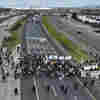
Pro-Palestinian demonstrators shut down airport highways and bridges in major cities
More than 100 people were arrested at Emerson College in Boston early Thursday morning after police tore down an encampment there. The school subsequently added Boylston Place Alley, where the encampment was located, to its list of campus locations where demonstrations are not allowed.
At The University of Texas at Austin, almost 60 people were arrested Wednesday for loitering. The following day, faculty members gathered at a rally and called for the school's president, Jay Hartzell, to resign after he praised the school and law enforcement for exercising restraint against the protestors, KUT reported .
Charges for all of the students have since been dropped , according to NPR member station KUT.
- student protests
- emory university
- columbia university
- University of Southern California
- Israel Palestine
- Accessibility Options:
- Skip to Content
- Skip to Search
- Skip to footer
- Office of Disability Services
- Request Assistance
- 305-284-2374
- High Contrast
- School of Architecture
- College of Arts and Sciences
- Miami Herbert Business School
- School of Communication
- School of Education and Human Development
- College of Engineering
- School of Law
- Rosenstiel School of Marine, Atmospheric, and Earth Science
- Miller School of Medicine
- Frost School of Music
- School of Nursing and Health Studies
- The Graduate School
- Division of Continuing and International Education
- People Search
- Class Search
- IT Help and Support
- Privacy Statement
- Student Life
- University of Miami
- Division of University Communications
- Office of Media Relations
- Miller School of Medicine Communications
- Hurricane Sports
- UM Media Experts
- Emergency Preparedness
- Awards & Honors
- Career Development
- Press Releases
- Student Scholarships
- Student Spotlight
- More Headlines
- Admissions Events
- Alumni Events
- Continuing Legal Education
- Publications
- Prospective Students
- Faculty & Academics
- Alumni & Giving
- Latest Headlines
- Subscribe to News@TheU Newsletter
- UM NEWS HOME
- Miami Law Clinic Aids in Federal Action Curtailing Unnecessary Intimate Exams
Miami Law Aids in Federal Action Curtailing Unnecessary Intimate Exams
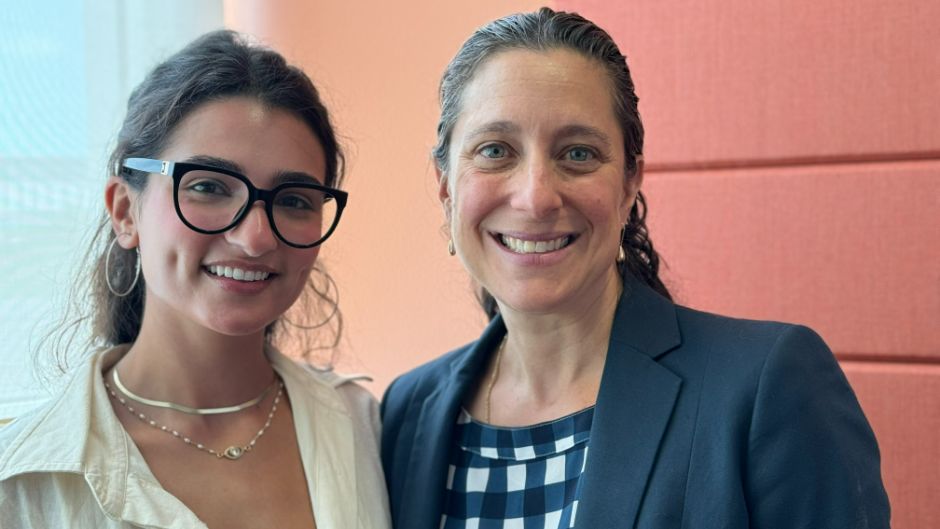
By Catharine Skipp [email protected] 04-16-2024
In April, the U.S. Department of Health and Human Services issued guidelines to hospitals and medical schools to address the practice of performing intimate exams, like pelvic exams, without the expressed written consent of the patient.
A New York Times investigation found the practice was widespread, often on women under anesthesia, and frequently used as a training exercise even though often medically unnecessary. Hospitals not adhering to the new rules risk losing their participation in Medicare and Medicaid programs.
The guidelines grew from an initiative begun by Professor Caroline Bettinger-López while she was on leave while serving as a senior advisor on Gender and Equality at the U.S. Department of Justice. She was integral to the 2023 Gender Policy Council that released the National Plan to End Gender-Based Violence : Strategies for Action. It was the first-ever national plan to advance an unprecedented and comprehensive approach to preventing and addressing sexual violence, intimate partner violence, stalking, and other forms of gender-based violence.
Bettinger-López, also founder and director of the Human Rights Clinic , provided guidance for an externship with DOJ with 2L Nicole Azarian, who was concurrently interning in the Human Rights Clinic , and partnering with the Department of Justice's Office for Victims of Crime and another law student at Duke Law School, Catherine Gorey.
"Nicole and Catherine took a deep dive into researching this issue, culminating in a detailed memo and a presentation to a group of interested parties within the federal government," said Bettinger-López. "And remarkably quickly for government processes, the Department of Human Services, through the Centers for Medicare & Medicaid Services, issued a new guidance on the issue, mandating explicit informed consent from patients for intimate examinations, aiming to ensure that patients maintain their right to bodily autonomy."
The Human Rights Clinic, part of Miami Law's Human Rights Program , promotes social and economic justice globally and in the U.S. Students gain firsthand experience in cutting-edge human rights litigation and advocacy at the local, national, regional, and international levels.
The clinic, one of nine, is just a part of Miami Law's experiential learning offerings, central to the School of Law's mission to prepare students for modern legal practice.
“One of the reasons that I chose Miami Law is for its experiential learning opportunities," said Azarian. "During my 2L year, I will have the opportunity to compete in the International Criminal Court in The Hague with the International Moot Court Program , have worked as an intern with the Human Rights Clinic, and was able to do an externship with the Department of Justice’s Office for Victims of Crime. My law school dreams have come true!
"Seeing the research I conducted with Catherine Gorey of Duke University School of Law and Caroline Bettinger-López, whom I met through Miami’s Human Rights Clinic, make a real difference within federal government has been an unbelievably rewarding and inspiring learning experience,” she said.
Read more about Miami Law's clinics.
Campus Visit Reservation Form
Learn about us, j.d., ll.m., and s.j.d., get started.

University of Miami School of Law
- 1311 Miller Drive Coral Gables , FL 33146
- [email protected]
- Current Students
- Careers - OCPD
Quick Links
- Academic Calendar - Law School
- Academic Calendar - University
- Events Calendar
Communications
- For the Media
- Web Feedback
- ABA Required Disclosures
- Policies & Privacy Statements
- Visiting the Law School
- Parking & Transportation
- social-facebook
- social-twitter
- social-youtube
- social-instagram
- social-linkedin
- social-flickr
Copyright: 2024 University of Miami. All Rights Reserved. Emergency Information Privacy Statement & Legal Notices Title IX & Gender Equity Website Feedback
Individuals with disabilities who experience any technology-based barriers accessing the University’s websites or services can visit the Office of Workplace Equity and Inclusion .
Scientists push new paradigm of animal consciousness, saying even insects may be sentient

Bees play by rolling wooden balls — apparently for fun . The cleaner wrasse fish appears to recognize its own visage in an underwater mirror . Octopuses seem to react to anesthetic drugs and will avoid settings where they likely experienced past pain.
All three of these discoveries came in the last five years — indications that the more scientists test animals, the more they find that many species may have inner lives and be sentient. A surprising range of creatures have shown evidence of conscious thought or experience, including insects, fish and some crustaceans.
That has prompted a group of top researchers on animal cognition to publish a new pronouncement that they hope will transform how scientists and society view — and care — for animals.
Nearly 40 researchers signed “ The New York Declaration on Animal Consciousness ,” which was first presented at a conference at New York University on Friday morning. It marks a pivotal moment, as a flood of research on animal cognition collides with debates over how various species ought to be treated.
The declaration says there is “strong scientific support” that birds and mammals have conscious experience, and a “realistic possibility” of consciousness for all vertebrates — including reptiles, amphibians and fish. That possibility extends to many creatures without backbones, it adds, such as insects, decapod crustaceans (including crabs and lobsters) and cephalopod mollusks, like squid, octopus and cuttlefish.
“When there is a realistic possibility of conscious experience in an animal, it is irresponsible to ignore that possibility in decisions affecting that animal,” the declaration says. “We should consider welfare risks and use the evidence to inform our responses to these risks.”
Jonathan Birch, a professor of philosophy at the London School of Economics and a principal investigator on the Foundations of Animal Sentience project, is among the declaration’s signatories. Whereas many scientists in the past assumed that questions about animal consciousness were unanswerable, he said, the declaration shows his field is moving in a new direction.
“This has been a very exciting 10 years for the study of animal minds,” Birch said. “People are daring to go there in a way they didn’t before and to entertain the possibility that animals like bees and octopuses and cuttlefish might have some form of conscious experience.”
From 'automata' to sentient
There is not a standard definition for animal sentience or consciousness, but generally the terms denote an ability to have subjective experiences: to sense and map the outside world, to have capacity for feelings like joy or pain. In some cases, it can mean that animals possess a level of self-awareness.
In that sense, the new declaration bucks years of historical science orthodoxy. In the 17th century, the French philosopher René Descartes argued that animals were merely “material automata” — lacking souls or consciousness.
Descartes believed that animals “can’t feel or can’t suffer,” said Rajesh Reddy, an assistant professor and director of the animal law program at Lewis & Clark College. “To feel compassion for them, or empathy for them, was somewhat silly or anthropomorphizing.”
In the early 20th century, prominent behavioral psychologists promoted the idea that science should only study observable behavior in animals, rather than emotions or subjective experiences . But beginning in the 1960s, scientists started to reconsider. Research began to focus on animal cognition, primarily among other primates.
Birch said the new declaration attempts to “crystallize a new emerging consensus that rejects the view of 100 years ago that we have no way of studying these questions scientifically.”
Indeed, a surge of recent findings underpin the new declaration. Scientists are developing new cognition tests and trying pre-existing tests on a wider range of species, with some surprises.
Take, for example, the mirror-mark test, which scientists sometimes use to see if an animal recognizes itself.
In a series of studies, the cleaner wrasse fish seemed to pass the test .
The fish were placed in a tank with a covered mirror, to which they exhibited no unusual reaction. But after the cover was lifted, seven of 10 fish launched attacks toward the mirror, signaling they likely interpreted the image as a rival fish.
After several days, the fish settled down and tried odd behaviors in front of the mirror, like swimming upside down, which had not been observed in the species before. Later, some appeared to spend an unusual amount of time in front of the mirror, examining their bodies. Researchers then marked the fish with a brown splotch under the skin, intended to resemble a parasite. Some fish tried to rub the mark off.
“The sequence of steps that you would only ever have imagined seeing with an incredibly intelligent animal like a chimpanzee or a dolphin, they see in the cleaner wrasse,” Birch said. “No one in a million years would have expected tiny fish to pass this test.”
In other studies, researchers found that zebrafish showed signs of curiosity when new objects were introduced into their tanks and that cuttlefish could remember things they saw or smelled . One experiment created stress for crayfish by electrically shocking them , then gave them anti-anxiety drugs used in humans. The drugs appeared to restore their usual behavior.
Birch said these experiments are part of an expansion of animal consciousness research over the past 10 to 15 years. “We can have this much broader canvas where we’re studying it in a very wide range of animals and not just mammals and birds, but also invertebrates like octopuses, cuttlefish,” he said. “And even increasingly, people are talking about this idea in relation to insects.”
As more and more species show these types of signs, Reddy said, researchers might soon need to reframe their line of inquiry altogether: “Scientists are being forced to reckon with this larger question — not which animals are sentient, but which animals aren’t?”
New legal horizons
Scientists’ changing understanding of animal sentience could have implications for U.S. law, which does not classify animals as sentient on a federal level, according to Reddy. Instead, laws pertaining to animals focus primarily on conservation, agriculture or their treatment by zoos, research laboratories and pet retailers.
“The law is a very slow moving vehicle and it really follows societal views on a lot of these issues,” Reddy said. “This declaration, and other means of getting the public to appreciate that animals are not just biological automatons, can create a groundswell of support for raising protections.”
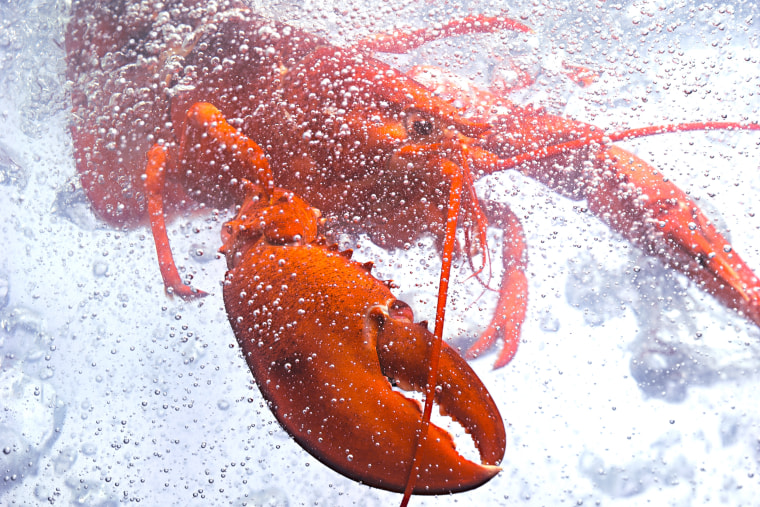
State laws vary widely. A decade ago, Oregon passed a law recognizing animals as sentient and capable of feeling pain, stress and fear, which Reddy said has formed the bedrock of progressive judicial opinions in the state.
Meanwhile, Washington and California are among several states where lawmakers this year have considered bans on octopus farming, a species for which scientists have found strong evidence of sentience.
British law was recently amended to consider octopuses sentient beings — along with crabs and lobsters .
“Once you recognize animals as sentient, the concept of humane slaughter starts to matter, and you need to make sure that the sort of methods you’re using on them are humane,” Birch said. “In the case of crabs and lobsters, there are pretty inhumane methods, like dropping them into pans of boiling water, that are very commonly used.”
Evan Bush is a science reporter for NBC News. He can be reached at [email protected].

IMAGES
VIDEO
COMMENTS
The best way to know whether Texas Law is right for you is to check it out for yourself. You can meet students, ask questions, watch classes, and see our spectacular campus. ... Visit the Blanton Museum. UT Austin's art museum is home to more than 21,000 works from artists such as Andy Warhol, Frida Kahlo, and Rene Magritte. And be sure to ...
UT CLE; Getting Here. Directions and Parking; Building Maps; Breadcrumb navigation. Texas Law Home; ... Enter your email address and a password to schedule a Texas Law guided tour or class visit. Account Information Email Address. Enter Password. Forgot your password? Visit Us. 727 E. Dean Keeton Street Austin, Texas 78705 (512) 471-5151.
During your visit, you can tour the College of Law building with a student ambassador, attend a law school class and meet with a financial aid advisor. Visits are available during the fall and spring semesters and are open to anyone interested in UT Law. If travel to Knoxville isn't possible, we're also happy to connect with you virtually.
UT CLE; Getting Here. Directions and Parking; Building Maps; Breadcrumb navigation. ... Texas Law Applicant Status * ... please let us know at least five business days prior to your visit. You may explain here: Visit Us. 727 E. Dean Keeton Street Austin, Texas 78705
CONTACT INFORMATION. Ask a Librarian(Reference Desk) (Email, Chat, or call 512-471-6220) Circulation Desk ([email protected] or call 512-471-7726) Tech Desk (UT Law Student support) ([email protected], Chat or call 512-232-1567) SPOTLIGHT & NEWS. Studying at Tarlton. Tarlton's Past Exam Databaseis available for Texas Law students as ...
Visit Campus. Envision yourself at UT Austin by visiting our campus! We have a variety of options to help you explore the Forty Acres on your terms. In-person campus tours and info sessions are available. For those needing online options, check out our online tour or book an online info session.
Law #130/2004-OZ of October 25, 2004 On the Status and the Border of Elektrostal Urban Okrug, as amended by the Law #82/2010-OZ of July 1, 2010 On Amending the Law of Moscow Oblast "On the Status and the Border of Elektrostal Urban Okrug" and the Law of Moscow Oblast "On the Status and Borders of Noginsky Municipal District and the Newly ...
Some UT students, professors and free speech advocates criticized the university and law enforcement response, calling it "disproportionate" and an "attack on students".
In a 2019 post on social media, Gov. Greg Abbott made a show of signing into law a measure that he said would protect the freedom of speech at institutions of higher learning across Texas, which ...
The university said that of the approximately 100 people police detained, students "who produced a valid Northeastern ID were released." "They will face disciplinary proceedings within the ...
3:23 p.m. ET, April 24, 2024 "Tense interactions" and "physical struggles" erupt at UT-Austin campus amid pro-Palestinian protest. From Ashley Killough in Dallas
A recent visit to Elon University School of Law by the North Carolina Court of Appeals offered more than an avenue for students to observe appellate advocacy in real time. It also provided them an opportunity to learn directly from some of the state's leading jurists, including a former member of the Elon Law faculty.
In a statement to KXAN, a UT spokesperson said that 26 of the arrestees were unaffiliated with the university.Unlike the thirteen previous pro-Palestinian free speech events on campus, the ...
The couple updated a Facebook post on the Utah County Lost & Found PETS group that Clark made when Galena first went missing, explaining the story and describing the cat's survival as a "tender ...
Columbia University said Friday that it has banned a student protest leader from campus after a video resurfaced Thursday that showed the student saying Zionists "don't deserve to live."
Pro-Palestinian demonstrators, including university students, rallied at an encampment in support of Gaza at Alumni Park on the University of Southern California's campus on Wednesday.
The classes listed below will correspond to the classes available on the registration page. Monday Tuesday Wednesday Thursday Friday 9:05 - 10:12 Property Criminal Law Torts Criminal Law Property Torts Torts Criminal Law Property 10:30 - 11:37 Civil Procedure Contracts Civil Procedure Contracts Civil Procedure Contracts 1:05 - 2:12 Property Property Property Property 2:30 - […]
Texas Law grants a very limited number of requests to exceptional candidates who have demonstrated academic excellence who wish to visit the law school for one or two academic terms during the fall or spring (subject to course offerings). Applicants must also present compelling reasons to attend Texas Law. Application Timelines Admission Policies Before submitting […]
Around 100 protestors were arrested at Northeastern University on Saturday morning amid a pro-Palestine protest, according to the university. Northeastern University said the school's police ...
The University of Chicago Law School Federalist Society received the James Madison Chapter of the Year Award at the national organization's annual student symposium that was hosted at Harvard Law School this spring. The last time the Chicago chapter won the award was in 2019. The victory capped a very productive year for the Law School Federalist Society, characterized by robust efforts to ...
RALEIGH, N.C. — The future of diversity, equity and inclusion staff jobs in North Carolina's public university system could be at stake after a five-person committee swiftly voted to repeal a ...
At Columbia University's campus on Wednesday, the main quad looked like a stage set for confrontation. On one end stood Butler Library, a neoclassical colonnaded structure. At its base, a ...
The Best Place in the World to be a Law Student. Get ready to be part of one of the top law schools in America, with a dynamic faculty, vast career opportunities, and a massive alumni network. Texas Law promotes a culture of excellence that's collegial and inclusive, all in the heart of Austin—one of the fastest-growing and most vibrant ...
Columbia University's senate voted on Friday to approve a resolution that called for an investigation into the school's leadership, accusing the administration of violating established ...
At Emory University in Atlanta, protesters — including students from other Atlanta universities and area activists — clashed with state, city and university law enforcement on campus.
The decision by Columbia University's president to call in the New York Police Department to clear pro-Palestinian protesters from the campus last week appears to have sparked the spate of ...
A Texas Law degree is a powerful credential in job markets all over the country. And we are the #1 supplier of talent to the best employers in a large and growing region of the United States. ... UT CLE; Getting Here. Directions and Parking; Building Maps; J.D. Admissions. ... Visit Us. 727 E. Dean Keeton Street Austin, Texas 78705 (512) 471 ...
Visit Us; Juris Doctor (J.D.) About Our J.D. Program; J.D. Admissions; Recruiting Events; ... to professors, universities, and students, whose interests in academic freedom may conflict. The book reviews the case law, revealing its inconsistencies and ambiguities, proposes a theory of academic freedom as a distinctive First Amendment right, and ...
My law school dreams have come true! "Seeing the research I conducted with Catherine Gorey of Duke University School of Law and Caroline Bettinger-López, whom I met through Miami's Human Rights Clinic, make a real difference within federal government has been an unbelievably rewarding and inspiring learning experience," she said.
A decade ago, Oregon passed a law recognizing animals as sentient and capable of feeling pain, stress and fear, which Reddy said has formed the bedrock of progressive judicial opinions in the state.